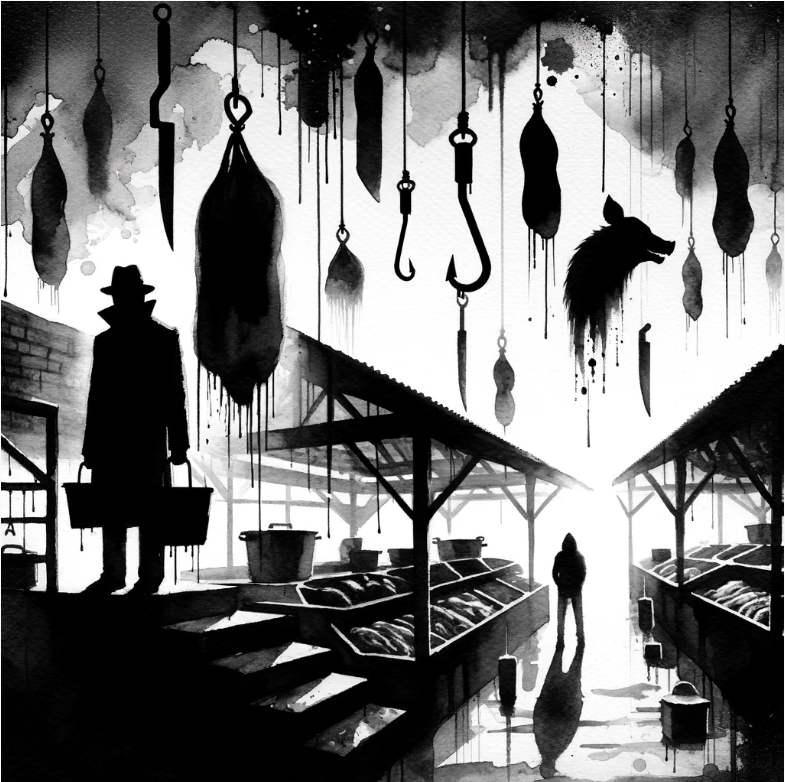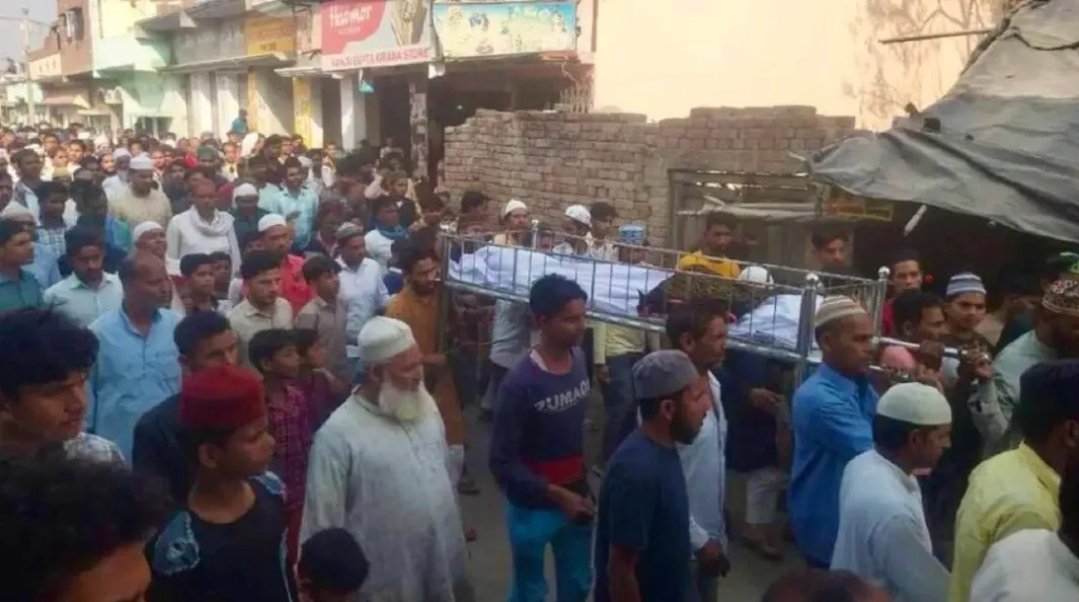How Tariffs, AI, and Robots Will Reshape Industry and Humanity
Tariffs are breaking old trade ties. AI and robots are rewriting the rules. The U.S.–China split is just the beginning of a new world map drawn in algorithms, not alliances.
Why do seemingly normal people commit atrocities and genocides? More importantly, why do millions other go along with these crimes as participants? We explore the Perpetration-Induced Trauma and its impact on the societies.


What makes normal seeming people commit atrocities that are unthinkable and unspeakable on fellow humans and other sentient beings?
When such crimes are done on scale then several other questions emerge.
Yes, there are the few psychopaths who indulge in the most heinous crimes, but what about the silent millions who not just condone it but even eulogize such beasts in human skin as heroes?
How does evil act itself out from seeming normal people?
We look at the various scenarios spanning crimes of colonization, genocides and slaughterhouses. Areas that are the strongholds of the phenomenon known as the Perpetration-Induced Trauma.
What we do takes a lot of work. So, if you like our content and value the work that we are doing, please do consider contributing to our expenses. Choose the USD equivalent amount in your own currency you are comfortable with.
On March 19th 2024, two brothers - Sajid and Javed - entered the house of Vinod Kumar and while Kumar had gone inside to get money for the these two Muslim neighbors, they went on the terrace and slit the throats of Vinod's two sons Ayush and Ahaan and then stabbed them 23 times before trying to escape!

Sajid was killed in a police encounter after he shot at the police when they tried to arrest him.
What was most shocking is that his funeral was widely attended and he was given a hero's send off by the local Muslim community.

This was not just the case with Sajid who had mercilessly slaughtered two teenagers and then drank their blood simply out of religious hatred.
This is the kind of crowds that gathered at the funeral of Mukhtar Ansari.
Uttar Pradesh: People in large numbers take part in the funeral procession of gangster-turned-politician Mukhtar Ansari in Mohammadabad, Ghazipur pic.twitter.com/PHGvhAJcp1
— ANI (@ANI) March 30, 2024
Who was Mukhtar Ansari?
Mukhtar Ansari, for example, was a mafia gangster in UP. He was a dreaded criminal and a psychopath.
Ansari said this about the killing to his aide over a phone call from the jail - “Choti Kat Li, Jai Shri Ram Mutthi Me”
In Ansari's eyes, the killing and the mutilation of Rai's body was clearly a religious action.
He himself died a natural death from a cardiac arrest. (Source: Post-mortem confirms Mukhtar Ansari died of cardiac arrest: Hospital source / Economic Times)
What was the reason for him to be treated like a hero?
Well, it goes deeper. The same treatment was given to terrorists Yakub Memon and Burhan Wani.
There's one common thread that links Mukhtar Ansari's funeral to Burhan Wani's and Yakub Memon's funeral. They were all mourned as martyrs.
— Rahul Shivshankar (@RShivshankar) March 31, 2024
Those lamenting the lack of freedom of expression in India should note.
In India, democracy is so caringly cradled (cringingly… pic.twitter.com/aiVp4UhKqi
The questions that one needs to ask are:
How did this cognitive dissonance become so large scale in one part of the society?
The fundamental question that one is constantly asking oneself is - Can one do evil without being evil?
We will delve into these questions using documented and peer-reviewed research that in some ways explains how psychopathic behavior can manifest at scale.
What causes perpetrators of unspeakable crimes and violence against fellow humans and sentient beings to do their unthinkable acts? How do they lose every iota of their human conscience as they go about it?
The social sciences of today are calling it as the Perpetration-Induced Trauma.
Perpetration-Induced Traumatic Stress (PITS) is a form of Post-Traumatic Stress Disorder (PTSD) that arises not from being a victim or a rescuer in trauma, but from being an active participant in causing trauma. This condition has been observed in individuals such as soldiers, executioners, or police officers, where it is socially acceptable or even expected for them to kill or inflict harm on others.
PITS is characterized by a range of symptoms similar to PTSD, including intrusive thoughts, avoidance behaviors, negative changes in mood and cognition, and alterations in arousal and reactivity. These symptoms can be more severe and present different patterns compared to PTSD caused by victimization.
The perpetration of such acts could have caused traumatic stress in the colonizers themselves, although historical accounts do not typically reflect this moral introspection. Instead, the colonizers often justified their actions through ideologies of racial superiority, civilizing missions, and economic exploitation, without apparent regard for the psychological impact of their actions on themselves or their victims.
Let us analyze this with historical evidence and context.
The genocide of Native Americans by Euro-American settlers marks one of the darkest chapters in history, involving a series of brutal massacres, forced relocations, and the systematic destruction of cultures and communities.
As settlers expanded westward across the North American continent, Indigenous peoples were always violently removed from their ancestral lands, subjected to devastating diseases to which they had no immunity, and faced policies aimed at their cultural assimilation (euphemism for destruction of their culture) or outright eradication.
This tragic period, spanning several centuries, led to the significant loss of life, heritage, and sovereignty among Native American tribes, leaving a lasting impact on the surviving populations and their descendants. The legacy of these actions continues to resonate, prompting ongoing discussions about recognition, reconciliation, and justice.
Judgements on the capabilities of non-Europeans and the moral obligations of ‘civilised’ peoples towards the ‘uncivilised’ has been a firm feature of history since Columbus planted the flag in the New World. Here, attitudes were most famously associated with sixteenth-century Spanish theological and juridical debates on the rationality of the Indians, which culminated in what became known as the Great Valladolid Controversy in 1550. In these juridical controversies the property rights of the Indians was of particular importance; and questions of how entitlement to land could be claimed, generated theories of its appropriation. The concept of terra nullius, meaning empty land, was central to such theories of justification. It was closely allied to the right of husbandry but what became more fundamental was its conceptual facilitation of the moral justification for appropriating ‘waste’ and under-cultivated land. This was the genius of John Locke. Indicative to terra nullius was also the justification of war as dictated by the universal laws of nature and nations if the indigenous people denied such appropriation. (Source: "The Changing Moral Justification of Empire: From the Right to Colonise to the Obligation to Civilise")
It was not just some random acts of targeted killings and torture.
Peter Burnett's address in California was a shameful testimony to what was planned and executed.
How a head of a Native American would fetch $5 and a scalp would get 50 cents.
The state of California spent a million dollars in those days to systematically eliminate the Native Americans.

Brendon Lindsay in his book titled "Murder State: California's Native American Genocide, 1846-1873" asks two very poignant questions about the genocide perpetrated by the European settlers on Native Americans.

Same questions that we asked in the beginning relative to the situation with Sajid, Mukhtar Ansari and other terrorists.
Two factors were at work: Institutionalized Hatred and Manifest Destiny.
Even people who had never met a Native American because they had been exterminated in their lands, had only one characterization of these people.
They were dangerous savages to be feared and never trusted.
When the Europeans would travel, they would be advised to be in large parties and have lots of arms. Despite this hate-filled advisories and narratives, Lindsay found violence between Native Americans and Euro-Americans very rare.
Despite little evidence, the narratives would describe the "violence and savagery" of the Native Americans very vividly.
The most shocking and devious aspect of the genocides by the Euro-Americans was that it was given a "legal framework of democracy". The mass murders were democratically orchestrated with full participation of the masses where the most egregious murderers were eulogized as heroes.

Do you see the devious brilliance of this strategy?
If you look closely - the same strategies have been used by the American establishments throughout its modern history. Even today.
The concept of Manifest Destiny is a 19th-century doctrine or belief that was prevalent in the United States. It held that the expansion of the US throughout the American continents was both justified and inevitable. The term was first used by journalist Stephen L. O'Sullivan in 1845 to advocate for the annexation of Texas and the Oregon Country to the United States. Manifest Destiny was grounded in the belief that Americans were divinely ordained to spread their democratic institutions and culture across the continent.
Lindsay puts it correctly. Even though the term "Manifest Destiny" may have been used by O'Sullivan, the fundamental ideology was rampantly being exercised to perpetrate the Native American genocide for long in North America.

The belief in Manifest Destiny provided a moral justification for the expansionist policies that resulted in the removal of Native American tribes from their ancestral lands, most notoriously through events like the Trail of Tears, where thousands of Native Americans died during forced relocations.
The concept of Manifest Destiny, in the context of populations that perpetrate genocides, can be seen as providing ideological support for such actions.
It was used to rationalize the taking of land and the subjugation or elimination of indigenous populations in the name of progress and civilization. The belief in a manifest destiny to expand not only justified the taking of territory but also the imposition of a new social and economic order, often at the expense of the existing cultures and societies. All based on divine providence.
Unsurprisingly, the concept of Manifest Destiny is deeply intertwined with the establishment and conceptualization of America as a Christian destination.
But Manifest Destiny was not simply a cloak for American imperialism and a justification for America’s territorial ambitions. It also was firmly anchored in a long standing and deep sense of a special and unique American Destiny, the belief that in the words of historian Conrad Cherry, “America is a nation called to a special destiny by God.” The notion that there was some providential purpose to the European discovery and eventual conquest of the land masses “discovered” by Christopher Columbus was present from the beginning. Both the Spanish and the French monarchs authorized and financed exploration of the “New World” because, among other things, they considered it their divinely appointed mission to spread Christianity to the New World by converting the natives to Christianity. Coming later to the venture, the British and especially the New England Puritans carried with them a demanding sense of Providential purpose. John Winthrop, Governor of the Massachusetts Bay Colony, gave the clearest and most far-reaching statement of the idea that God had charged the English settlers in New England with a special and unique Providential mission. “On Boarde the Arrabella, on the Attlantick Ocean, Anno 1630,” Winthrop delivered the blueprint for what Perry Miller has dubbed an “errand into the wilderness” which set the framework for most of the later versions of the idea that “America had been providentially chosen for a special destiny.” Winthrop delivered his lay sermon just before he and his fellow passengers disembarked on the shore of Boston harbor, the place, Winthrop proposed, to which God had called them to build up a model Bible commonwealth for Protestants in England and elsewhere to emulate. “Thus stands the cause between God and us. We are entered into Covenant with him for this work, we have taken out a commission,” he declared, adding “if the Lord shall please to hear us and bring us in peace to the place we desire, then hath he ratified this Covenant and sealed our Commission and will expect a strict performance of the Articles contained in it.” He went on to specify more full what fidelity to this commission entailed: the people of New England must “follow the counsel of Micah, to do justly, to love mercy, to walk humbly with our God. For this end, we must be knit together in this work as one man, we must entertain each other in brotherly affection, we must be willing to abridge ourselves of our superfluities for the supply of others necessities.” But it is near the close of the speech that he coined the phrase that has been invoked again and again (most recently by President Ronald Reagan) to express the idea of America’s providential uniqueness and destiny. If we are faithful to our mission, “we shall find that the God of Israel is among us, when tens of us shall be able to resist a thousand of our enemies, when he shall make us a praise and a glory, that men shall say of succeeding plantations: the lord make it like New England, for we must consider that we shall be as a City upon a Hill, the eyes of all people upon us.” (Source: "The Religious Origins of Manifest Destiny" / Donald M. Scott, Professor of History, Queens College and the Graduate Center of the City University of New York)
Having a divine purpose that necessitates genocide leads to complete numbing of all morality.
It is this one factor that enabled the perpetrators to keep on with the genocides and millions others to keep following and acquiescing to the devious and horrible plan of "Manifest Destiny" without remorse.
Now came our third question.
Just as Brendon Lindsay had asked those two questions, a reporter for The New Yorker, Hannah Arendt asked our third question.
It was as poignant a question as those by Lindsay.
She was covering the trial of Adolph Eichmann for his war crimes during World War II. Eichmann was the guy who was responsible for the transportation of millions of Jews and others to various concentration camps in support of the Nazi’s Final Solution.
She found that the man was "terrifyingly normal".

Despite her interesting question, in the case of Eichmann, her conclusions raised a lot of controversies.
Her strange characterization essentially tried to "humanize" a psychopath.
The philosopher Alan Wolfe, in Political Evil: What It Is and How to Combat It (2011), criticised Arendt for ‘psychologising’ – that is, avoiding – the issue of evil as evil by defining it in the limited context of Eichmann’s humdrum existence. Wolfe argued that Arendt concentrated too much on who Eichmann was, rather than what Eichmann did. For Arendt’s critics, this focus on Eichmann’s insignificant, banal life seemed to be an ‘absurd digression’ from his evil deeds. (Source: "What did Hannah Arendt really mean by the banality of evil?" / Aeon)
The question that Arendt had asked wasn't that irrelevant though.
This game of psychologizing is what the Indian journalists play with aplomb.
Now, here is Rajdeep Sardesai normalizing criminals like Mukhtar Ansari (whom we discussed earlier) reducing everything down to the "tandoori chicken" he had with that psychopath.
It is actions like these by the so-called journalists that allow perpetrators to keep on with their game in a legitimate way.
For, after all Tandoori Chicken is a good enough cloak on your conscience to make you a participant in extreme violence based on bigotry.
Slaughter houses are the closest that modern society can come close to replicating what can be seen to be unthinkable crimes of conscience.
Animal abuse is always the first step for a psychopathic homicidal person to use as an outlet for his/her unbridled and thoughtless aggression.
In a remarkable essay on BBC, people who worked at the slaughter house shared their experiences and impact on their minds, well-being and lives. How did just normal human beings - people who would love animals to a point that they wanted to be vets and care for young animals - ended up slaughtering innocent, loving and crying animals with a numbness that resembled the ways of serial killers.
The insides of the abattoirs are filthy and dirty places.
Animal feces on the floor, guts of the already slaughtered lying around, and blood on the walls.
The cows about to be slaughtered would be scared and in complete panic. And, it would show in their eyes. The workers were terrified.
The reel of the day would play in the nightmares over and over again.

These workers would bottle up their feeling and some of them turned suicidal.
A few years into my time at the abattoir, a colleague started making flippant comments about "not being here in six months". Everyone would laugh it off. He was a bit of a joker, so people assumed he was taking the mick, saying he'd have a new job or something. But it made me feel really uneasy. I took him into a side room and asked him what he meant, and he broke down. He admitted that he was plagued by suicidal thoughts, that he didn't feel like he could cope any more, and that he needed help - but he begged me not to tell our bosses. (Source: "Confessions of a slaughterhouse worker" / BBC)
Their humanity wouldn't let them live with their daily crimes.
Extensive and peer-reviewed studies have been done on the impacts of slaughterhouse jobs on peoples' well being.
Higher prevalence of depression amongst the slaughterhouse workers was a natural phenomenon.

In 2009, researchers Amy J. Fitzgerald, Linda Kalof, and Thomas Dietz released a study that explores and examines the links between slaughterhouses and rising crime rates.

There is enough empirical data that violent and sexual crimes increase significantly in the area near the slaughterhouses.
This particular study compared the FBI’s Uniform Crime Report and the US Census to see how crime rates changed as different industries came into different counties in the U.S. during the years of 1994-2002. They compared how crime rates differed around slaughterhouses and other industries. Their study found that slaughterhouse employment led to an increase of overall crime, yet more particularly violent and sexual crimes. According to the study, “The findings indicate that slaughterhouse employment increases total arrest rates, arrests for violent crimes, arrests for rape, and arrests for other sex offenses in comparision with other industries.” (Source: "Violence Translating Outside the Slaughterhouse" / New Roots Institute)
Yale Global Health Review had an interesting article on slaughterhouse workers.
“Down in the blood pit they say that the smell of blood makes you aggressive. And it does. You get an attitude that if that hog kicks at me, I’m going to get even. You’re already going to kill the hog, but that’s not enough. It has to suffer. When you get a live one you think, Oh good, I’m going to beat this sucker.” ~ statement of a slaughterhouse worker.
The desensitization and the unrequited though acquired hate through numbness quickly spills over from animals to humans.

So we have seen the impact from mental health and social research of the slaughter houses on the population near by.
How does spirituality look at this? (hat-tip to my friend Mayuresh on this research).
Annie Besant, founder of the Theosophist Society (and mentor for Jiddu Krishnamurti) addressed the astral regions surrounding the slaughterhouses.
The desire-bodies, (Kâmarûpa is the technical name for the astral body, from Kâma, desire, and rûpa, form) or astral bodies, of animals are found, as has just been stated, to lead an independent though fleeting existence on the astral plane after death has destroyed their physical counterparts. In “civilised” countries these animal astral bodies add much to the general feeling of hostility which was spoken of above, for the organised butchery of animals in slaughterhouses and by sport sends millions of these annually into the astral world, full of horror, terror, and shrinking from men. The comparatively few creatures that are allowed to die in peace and quietness are lost in the vast hordes of the murdered, and from the currents set up by these there rain down influences from the astral world on the human and animal races which drive them yet further apart and engender “instinctive” distrust and fear on the one side and lust of inflicting cruelty on the other. These feelings have been much intensified of late years by the coldly devised methods of the scientific torture called vivisection, the unmentionable barbarities of which have introduced new horrors into the astral world by their reaction on the culprits, (See Chapter III, on “Kâmaloka .”) as well as having increased the gulf between man and his “poor relations”. (Source: The Ancient Wisdom / "The Astral Plane" by Annie Besant Pg 70)
The astral bodies of the brutally and horribly executed animals "rain down" influences that create distrust, fear and worse - the lust for inflicting cruelty on the other.
The impact of more horrifying crimes and methods of killing will bring its own horrible impacts.
As long as the abattoirs and slaughterhouses are kept outside of the normal society, the impact can be minimized and the consequent violence resulting from the slaughterhouses can be contained.
But what if slaughtering is brought right into the homes and normal society?





Pictures courtesy The Guardian, The Independent and X post of Edward Reese
Look at these photographs. During Eid-ul-Adha, these are "normal" scenes in the developing countries with large Muslim societies.
During Eid ul-Adha, the ritual slaughter of animals such as sheep, goats, and cows is performed to honor the narrative found in the Quran. This story recounts how Prophet Ibrahim, known as Abraham in the Bible, was instructed by God to sacrifice his son Ismail, demonstrating the depth of faith and obedience.
The animal slaughter has been taken to be an obligatory practice for Muslims.
The question to ask is why was it even done in such a gruesome manner and what is its relevance even today? It is known to cause physical and emotional stress.
Of course, the slaughter of animals can also raise concerns about human and animal health, and public order.
Here is an Op-Ed from a Moroccan newspaper written last year.

Some pertinent points from this Op-ed:
Just because an act has a "divine blessing" does not make it immune to mental and psychological impact of the actions one takes.
Psychopathy where the perpetrator is desensitized to the pain and blood of the victim - animal or human - is the direct consequence of any practice of slaughtering.
If that is being done by people in the society at large in their homes as a practice for "masculine initiation" (based on obvious desensitization) then are we not creating conditions for psychopathic behavior to become rampant in the society?
Are we not forcing young kids on the road to becoming a psychopath by forced traumatic desensitization? A situation of child abuse?
Not much study has been done in this regard but the Islamic societies around the world are seeing sane voices of reason come out (like the Moroccon Op-ed) that question the reasons to push an entire society down that slippery slope.
It is time that the governments around the world take measures to keep slaughtering within slaughterhouses and not bring in those gory scenes right into our streets and neighborhoods. More than the visuals, it is the propensity of such acts to break the societies apart by promoting violence and torture.
Full ramifications of the Perpetration-induced trauma - where the aggressors numb themselves to normal human conscience - need to be be studied more in such societies.